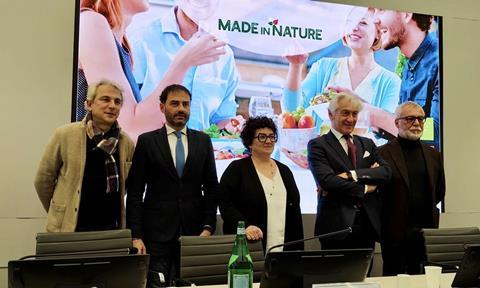As Made in Nature campaign concludes, research suggests there is still plenty of potential to grow sales

Sales of organic fruits and vegetables will only increase significantly if they are given more space in major retail chains, according to new research into the category’s future success.
That was one of the standout conclusions at a conference held last week in Milan to discuss Made in Nature, a three-year project funded by CSO Italy and the EU that aims to spread awareness of organic fresh produce.
During the conference, CSO presented the results of a new survey of around almost 3,000 people conducted by SEC Newgate in the project’s four target countries: France, Germany, Denmark, and Italy.
The results show that more than 60 per cent of those polled in all four countries buy organic fruits and vegetables in supermarkets.
CSO director Elisa Macchi noted that, on average, 20 per cent of consumers always buy organic fruits and vegetables, but 55 per cent buy them only when they feel the need.
The research also suggests consumers are buying more organic fruit and veg than they did three years ago. Denmark leads the way in terms of growth (+54 per cent), followed by Italy (+52 per cent), Germany (+49 per cent), and France (+38 per cent).
As Macchi pointed out, consumers say they buy organic because it is healthy, natural, and good for the environment. Price remains a very important factor, with one-third of respondents unwilling to spend more on organic products.
Category approach
Many of Italy’s leading organic companies are involved in the Made in Nature project, which concludes its current three-year term at the end of January 2025. These include Brio, Canova, Ceradini Group, Conserve Italia, Orogel, and Verybio.
Paolo Pari, who as director of Canova oversees one of Italy’s leading organic brands Almaverde Bio, notes that the research “shows we need to reorganise the offer because, if we consider modern [retail] distribution, we need to rethink strategies in the stores.”
He explained: “The criticisms of the price variable that constantly come up can be addressed by reorganising the offer. We need to introduce price differentiation based on varieties and sizes even in organic, as happens in the conventional department. A category-based approach is needed.”
Luca Zocca, Marketing Communication Consultant at Brio, turns the spotlight on two pivotal issues in the dialogue between producers, distributors, and consumers. On the one hand, “there is little consumer information about the values of organic. Even in other research, I have noticed that consumers often confuse organic, km0, and residual-zero products. It is important to inform and communicate, first of all, to those who sell fruit and vegetables on a daily basis. We have to,” Zocca continued, “communicate with our first customers, that is, the distributors, and train the employees in the departments.”
Paolo Bruni, president of CSO, pointed out that the great merit of organic farming has been to foster awareness first among consumers and then among producers.
“Forty years ago, when I started working in the fruit and vegetable industry, organic did not exist, and many chemicals were used in the fields that, besides being harmful to health, are also harmful to the environment,” he commented.
“In a world where, on the one hand, there is a strong obesity problem and, on the other hand, millions of people are dying of hunger, raising awareness and working to offer healthy and organic products is very important.”
Positive impression
The event concluded with remarks from CSO marketing director Luca Mari, who highlighted the results of the Made in Nature project in terms of engaging a very large audience in all four countries.
During three years, he said, the campaign has made more than 264mn individual impressions, reached more than 13mn consumers with its direct marketing activities, and interacted with 152,000 buyers and trade operators. This was a decidedly positive result, he said, and had achieved an increase in perceived value for organic fruits and vegetables.



